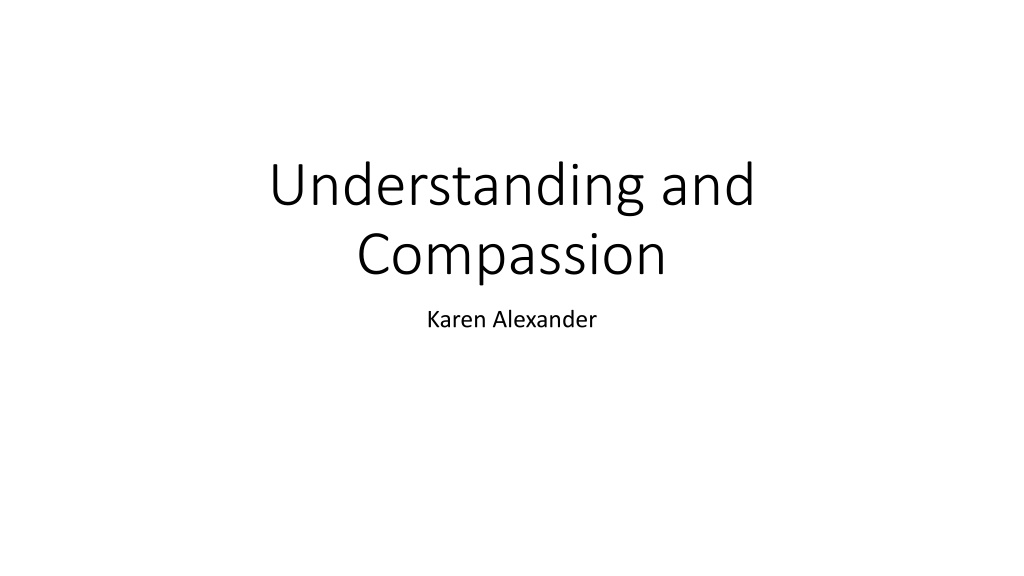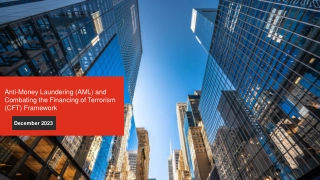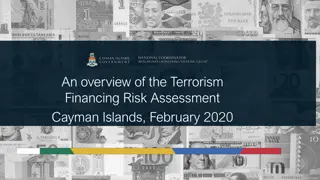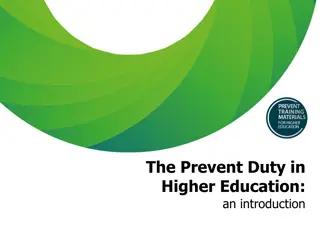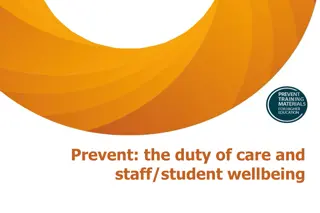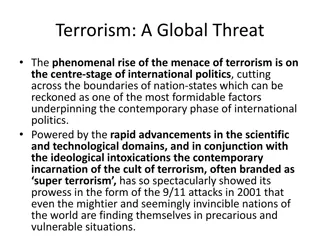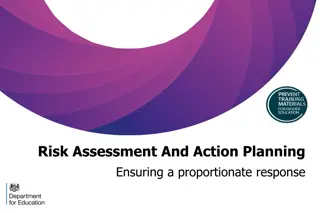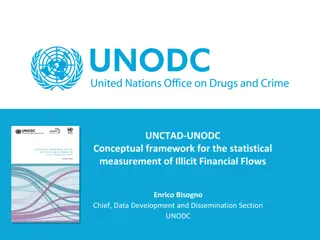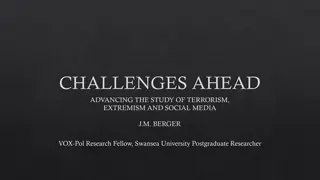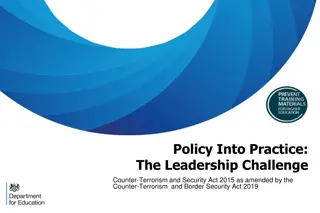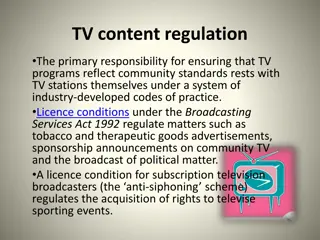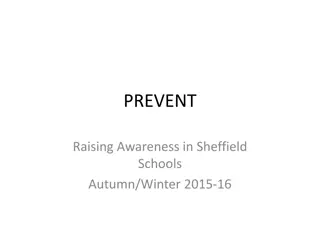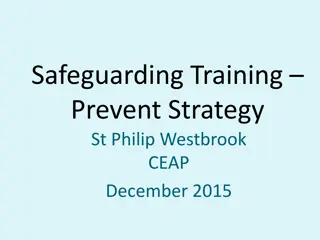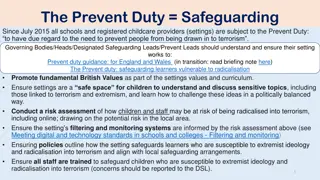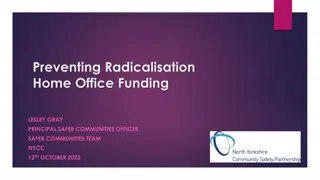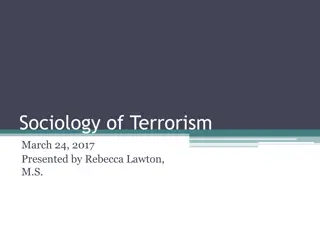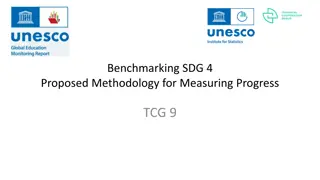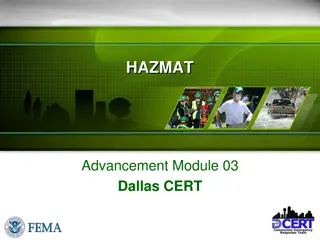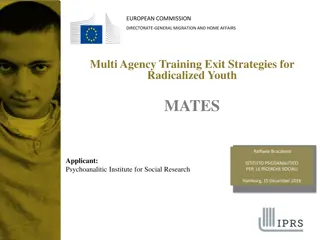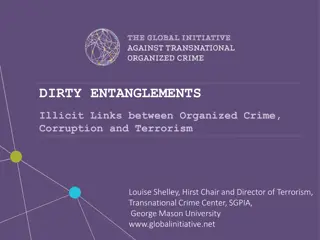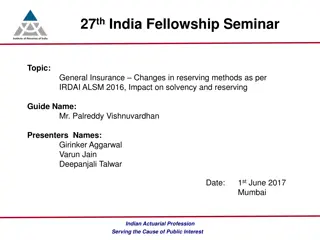Understanding Social Progress and Terrorism: Factors and Solutions
Exploring the socio-economic factors contributing to terrorism and hindering social progress, this content delves into the correlation between unemployment, state repression, violence, and terrorism. Key factors analyzed include weak state capacity, corruption, extremist ideologies, and social injustice. It also discusses the Eight Pillars for Peace outlined by the Institute for Economics and Peace, emphasizing the importance of addressing issues like inequality, discrimination, and historical conflict to foster stability and prevent terrorism.
Download Presentation

Please find below an Image/Link to download the presentation.
The content on the website is provided AS IS for your information and personal use only. It may not be sold, licensed, or shared on other websites without obtaining consent from the author. Download presentation by click this link. If you encounter any issues during the download, it is possible that the publisher has removed the file from their server.
E N D
Presentation Transcript
Understanding and Compassion Karen Alexander
Warm Up (quick write) What makes a person a terrorist?
Mohamed Ali The link between unemployment and terrorism For the young and unemployed in the world's big cities, dreams of opportunity and wealth do come true but too often because they're heavily recruited by terrorist groups and other violent organizations. Human rights advocate Mohamed Ali draws on stories from his native Mogadishu to make a powerful case for innovation incubators for our cities' young and ambitious.
The Global Terrorism Index report details the most significant socio-economic correlates with terrorism. There are three groups of factors: 1. Social hostilities between different ethnic, religious and linguistic groups, lack of intergroup cohesion and group grievances. 2. Measures of state repression such as extrajudicial killings, political terror and gross human rights abuses. 3. Other forms of violence such violent crime, organized conflict deaths and violent demonstrations.
Key factors analyzed were: Weak state capacity. Illegitimate and corrupt governments. Powerful external actors upholding corrupt regimes. Extremist ideologies. Historical violence and conflict. Inequality in power. Repression by foreign occupation or colonial powers. Discrimination based on ethnic or religious origin. Failure of the state to integrate dissident groups of emerging social classes. Social injustice.
Pillars of Peace According to the Institute for Economics and Peace these are the Eight Pillars for Peace.
3-2-1 What are three indicators that can keep a country from achieving social progress? What are two actions government leaders can take to help their country progress? Give one example of how the lack of social progress can create an unstable society or even lead to terrorism.
Our Focus Countries (rank/country/score) 1 Iraq 10 2 Afghanistan 9.39 3 Pakistan 9.37 4 Nigeria 8.58 5 Syria 8.12 7 Somalia 7.41 8 Yemen 7.31 12 Kenya 6.58 13 Egypt 6.5 14 Lebanon 6.4 15 Libya 6.25 18 Dem Republic of the Congo 5.9 19 Sudan 5.77 20 South Sudan 5.6 32 Israel 4.66 28 Iran 4.9 55 Saudi Arabia 2.71 100 United Arab Emirates 0.29 118 Chad 0.05 124 Oman 0
Helpful Questions (handout) Create a realistic story with as many details as possible. You must have answers for each of these questions. Use these questions to tell your story during the Majlis. Use data from your research to back up your answers. Any information not received on your card should be created using the information from your research. You will be graded on creativity and detail. Are you Male or Female? Are you single or married or widowed? How old were you when you got married? Did you chose your spouse? Do you have children? How many? Do you want more? Can you make the choice to stop having children? How old are you? Are you free to practice your religion? Can you read? What is you highest year of education? Do you have plans for more education? Where do you live? Where do you call home? Do you feel welcome? What is your house like? What is your neighborhood like? Is it clean? Is it environmentally safe? Is it easy to live there? Do you have access to food and water? Are you personally safe from immediate harm? If no please explain Are you healthy? Can you see a doctor if you are or get sick can? Are you hungry? Is there anything else we should know about you? Do you own anything of value? Do you own a home? Are you free to discuss your concerns with the government? Can you meet with others who may share the same concerns? Are you able to move somewhere else if you are not satisfied with your current place? How do you feel about your life? Would you say you are happy? What is most important to you? Do you have any goals? What do you see in your future? What can your leaders do to help you?
The Majlis Majlis are a public audience held by a chieftain, monarch, or other ruler to listen to the requests of petitioners. It comes from the tribal culture of the Middle East and North Africa.
Debrief What is the most important indicator measured? Why? Can you think of a situation similar to these that created similar outcomes? Explain What did you learn from this lesson?
